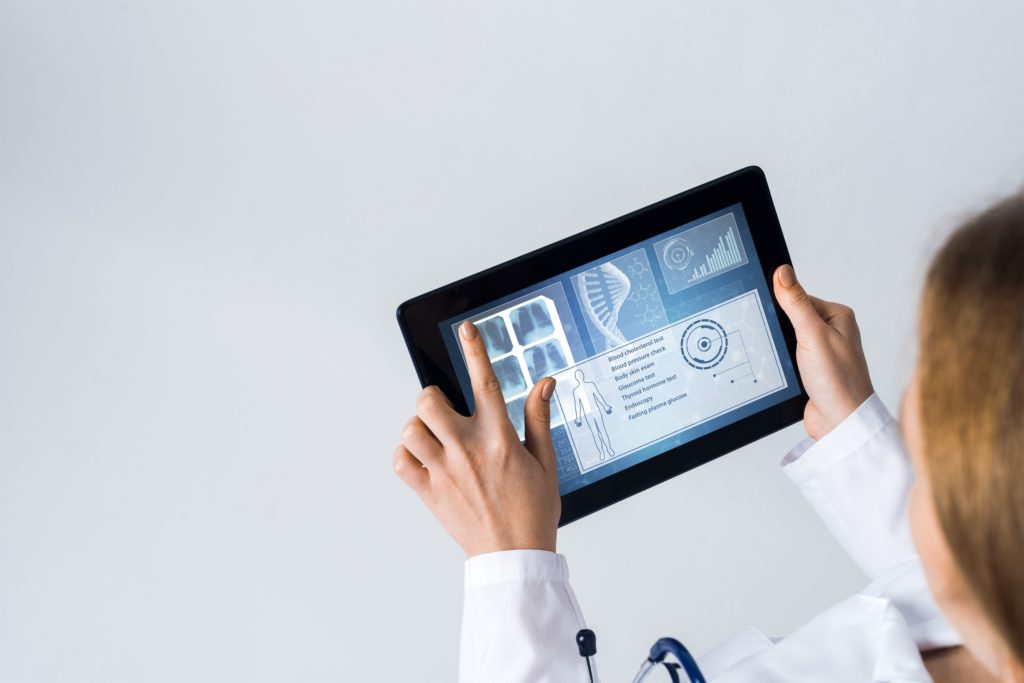Efficiency and Safety: The Role of IT Management in Healthcare

As technology continues to advance at a blistering pace, its role in healthcare has become increasingly clear. Many hospitals are now leveraging digital transformation to improve clinical and operational decision-making.
Technological transformations pave the way for healthcare providers to rely on managed IT services and shift the whole sector towards a more efficient, secure, and patient-centered path without the burden of additional operational costs. This holds especially true for medical institutions, where IT Management’s prowess lies in ensuring the seamless integration of technology into daily processes to boost efficiency and patient satisfaction in a fragmented US healthcare environment. Moving forward, medical institutions will need to leverage these technological advancements to stay ahead of the curve.
Keep reading to delve deeper into the present role of IT management in healthcare and its promising future.
What Is Health IT Management?
Health Information Technology (Health IT) is the comprehensive management of health information across computerized systems and its secure exchange between consumers, providers, government entities, and insurers. It is an integral part of today’s healthcare infrastructure, promoting an efficient, secure, and patient-focused approach to providing medical care.
Health IT includes various technologies and applications, such as:
- Electronic Health Records (EHR)
- Computerized physician order entry systems
- Health information exchange systems
These platforms streamline processes, reduce manual work, enable ease of data accessibility, and improve the overall efficiency of healthcare services. Moreover, Health IT positively impacts healthcare quality by preventing medical errors, reducing healthcare costs, increasing administrative efficiencies, decreasing paperwork, and expanding access to affordable healthcare.
How Can IT Management Help Healthcare Providers?

Healthcare providers depend on accurate and timely information to provide the best possible care. IT Management for medical institutions entails using sophisticated systems to acquire, store, and analyze critical data efficiently. This allows healthcare professionals to make informed decisions swiftly, impacting patient outcomes positively while maintaining compliance with the regulations that protect the privacy and security of patients’ information.
Here are the most important benefits of IT Management in the healthcare industry:
Data Protection and Security
Data security is a top priority in the healthcare industry, given the sensitive nature of patient information. IT Management in medical institutions ensures robust protective measures, thereby preventing data breaches and maintaining patient trust.
Big Data Analysis
Big data, a powerful product of IT Management, holds immense potential in healthcare. It can analyze vast amounts of data quickly, providing insights for accurate and efficient decision-making. Its predictive capabilities can lead to early disease detection, personalized treatments, and improved healthcare outcomes.
Electronic Health Records (EHRs)
Electronic Health Records enhance care delivery by providing an integrated, real-time digital version of a patient’s health history. These records can be efficiently accessed, managed, and updated, thereby enabling seamless collaboration between various healthcare professionals.
Data-Driven Decision-Making Processes
Health-managed IT positively impacts healthcare quality by preventing medical errors, reducing healthcare costs, increasing administrative efficiencies, decreasing paperwork, and expanding access to affordable healthcare. By facilitating immediate, secure, and efficient access to health information, these digital platforms support informed decision-making processes.
Practice Management Software
Practice management software, a product of advanced IT management, aids healthcare providers in streamlining administrative and billing tasks. This software usually helps automate functions, including:
- Scheduling appointments
- Managing patient data
- Processing billing
- Register insurance claims
Adherence to Regulations
Health IT management also enables healthcare providers to leverage efficient cloud-based solutions to manage electronic protected health information (ePHI) in compliance with HIPPA regulations, ensuring that privacy is maintained and data is transmitted securely.
As healthcare becomes increasingly digital, the importance of well-managed Health IT systems cannot be overstated. These systems stand as pillars of a digital healthcare landscape, transforming the way data is used and health services are provided for the best possible outcomes.
What are the Challenges of Healthcare Technology and IT Management?
The healthcare sector has recognized the transformative power of technology, and the emergence of COVID-19 accelerated this evolution. Advances in IT Management have helped healthcare providers swiftly adapt and revolutionize traditional services. Innovations, such as telemedicine, artificial intelligence (AI) in diagnostics, and digital health records, have transformed the healthcare landscape, enabling personalized, efficient, and high-quality care.
The healthcare landscape has changed since 2020, and yet patients are requesting speedy, efficient, and remote medical services. Let’s unpack the vast potential and significant challenges that the future of healthcare technology holds.
Embracing Telehealth and Remote Monitoring
Telehealth has already started transforming healthcare services. It’s now possible for patients to receive medical care without the need for an in-person office visit. The trend doesn’t seem to be decreasing. Telehealth is becoming more widely accepted among patients and specialists. This step-change was possible due to increased consumer willingness to use this type of service, particularly after the pandemic, rising provider willingness to use it, and regulatory changes enabling greater access and reimbursement.
Telehealth offers a chance to reinvent virtual and hybrid virtual/in-person care models. What’s more, further integrating this healthcare service with remote patient monitoring technologies, like wearable devices, would enable real-time observation of patients’ vitals, even from the comfort of their homes.
Data Sharing and the Need for Transparency
Even with these leaps in technological adoption, hurdles remain around data sharing and transparency. Patient data is often siloed and not readily shared across providers, leading to potential redundancies, treatment delays, and even harmful outcomes for patients. A HIPAA-compliant and secure data-sharing platform for medical providers is crucial for advancing healthcare technology and improving patient outcomes.
Cost transparency has also been another long-term issue in the healthcare sector. Patients often lack clarity on the details and expenses of medical services rendered. By leveraging technology to provide direct access to critical medical information, healthcare can become more patient-friendly, enabling individuals to make informed decisions about their health.
Using Predictive Analytics
The deployment of AI and machine learning (ML) in healthcare allows for potentially life-saving predictions, such as analyzing a patient’s likely response to specific medications or predicting hospital readmission rates.
These emerging trends could transform not just treatment methodologies but also preventative care, enabling a more cost-effective and proactive healthcare model.
Healthcare’s Technological Revolution
While the promise of advanced health technology seems bright, healthcare faces a considerable challenge in harnessing the power of emerging technological solutions. It requires sensitive iterative processes, extensive testing, and expert collaboration between tech companies and clinicians.
Keeping the focus on providing accessible, affordable, high-quality medical care, IT Health management, and other technological solutions presents a promising future for the sector. At Axigent Technologies Group, we understand that managing sensitive data and networks in healthcare comes with unique challenges. We are committed to propelling your success by providing scalable, flexible IT solutions that minimize costs and eliminate unnecessary complexities. Reach out to us today for a consultation!
